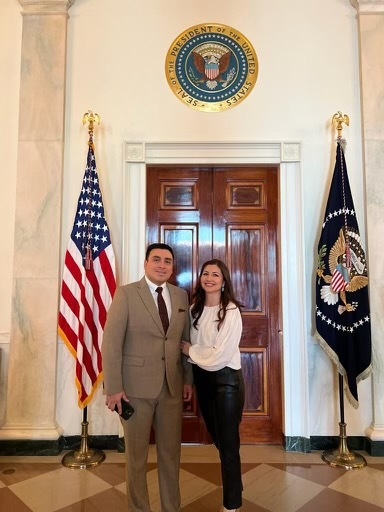Food can be one of the most useful ways to build bridges with someone — especially someone from a different culture. So it only makes sense that the U.S. Department of State would have a special program called the CulinaryCorps.
When Debby Portillo-Gonzalez and her husband Fernando, who own Riverdale Park’s 2Fifty BBQ, first got an email with the offer from the State Department, “We were like, ‘is this spam?’” she joked. “But we recognized the name of the person that was signing it. It was a customer. We’ve seen him before.”
In fact, they had seen him lots of times, just as often as he’d ordered. So they called him to find out what was going on.
The program is made up of more than 80 of the country’s most influential chefs and culinary professionals who travel abroad and represent the U.S. in order to foster foreign relations over the one thing we can all come together over — food.
The group of culinary ambassadors includes names that just about any foodie would know, from Jose Andres to Padma Lakshmi.
Chefs hailing from the DMV are on there too, such as Amy Brandwein, who owns downtown D.C.’s Centrolina, and Michael Friedman, who opened the highly regarded The Red Hen in the Bloomingdale neighborhood. But a Prince George’s County couple still can’t believe they’re on the list too.

“It’s all about showing what American cuisine is to the world,” she said. “Heads of state can come to the U.S. … and with this new program we are going to be able to show other heads of state, other people that come to the U.S., what American cuisine is. That is, Native American food, soul food, something that has more substance and that is properly American.”
It also could include opportunities to travel overseas to other embassies, as well as get involved in philanthropic and charitable activities with nonprofit groups in times of extreme need.
The program is a joint venture with the James Beard Foundation, a champion of the finest in American restaurants and culinary arts.
“I can’t think of a better diplomatic tool than food,” said Fernando, who says he has long espoused the virtues of being able to sit at a picnic table and casually eat barbecue among other people. “Chances are you’re going to have a great conversation about food that is beyond any … backgrounds that we all have. Food will definitely unite that group. We see it every day.”
Recently, the duo got to attend a special banquet at the State Department with other members of the Culinary Corps. They also got a White House tour.
The ugly side of all their newfound attention has been some of the comments the two have gotten online as they bragged about their honor. Gonzalez and his wife are originally from El Salvador and moved here to provide a better, safer life for their daughter. They’re considered permanent residents of the United States but still have years to go before they’re eligible to apply for U.S. citizenship, which is their goal.
“For us, personally, it’s almost like a validation of what we’re doing here in the community,” he said. “We’re not from Texas. We weren’t born here. And here we are, serving Texas BBQ every day.”
“We just wanted to have a business that we could feed our daughter with,” Portillo-Gonzalez added. The restaurant business runs in her family, which is still in El Salvador, while Fernando learned how to smoke barbecue through sheer passion and determination.
“We’re very grateful, and we know that it’s not common. We acknowledge that what has happened to us, it’s not something common.”
“To be honest it’s still a shock to us,” she added. “Us being not from the United States, and actually being able to show the world what American cuisine is, is really mind blowing.”
It’s also a story she believes will resonate around the world by “making sure the world understands that Americans are also immigrants and that (you don’t) necessarily have to be born here in order to show the world what America is.”
In fact, the journey they’ve taken to get to this point, and the conversation it generates among customers who see traditional Texan sides given a Central American twist, is a badge of honor too.
But Portillo-Gonzalez is hopeful that they can serve not only as ambassadors of America and American cuisine but also of mom-and-pop restaurants like theirs.
“Let’s support mom-and-pop shops instead of national chains, because that supports an array, in your community of people that also live off this,” she said. “So it’s much more than just cooking. It’s spreading the word about how food can unite and help communities not only in America, but also elsewhere.”







